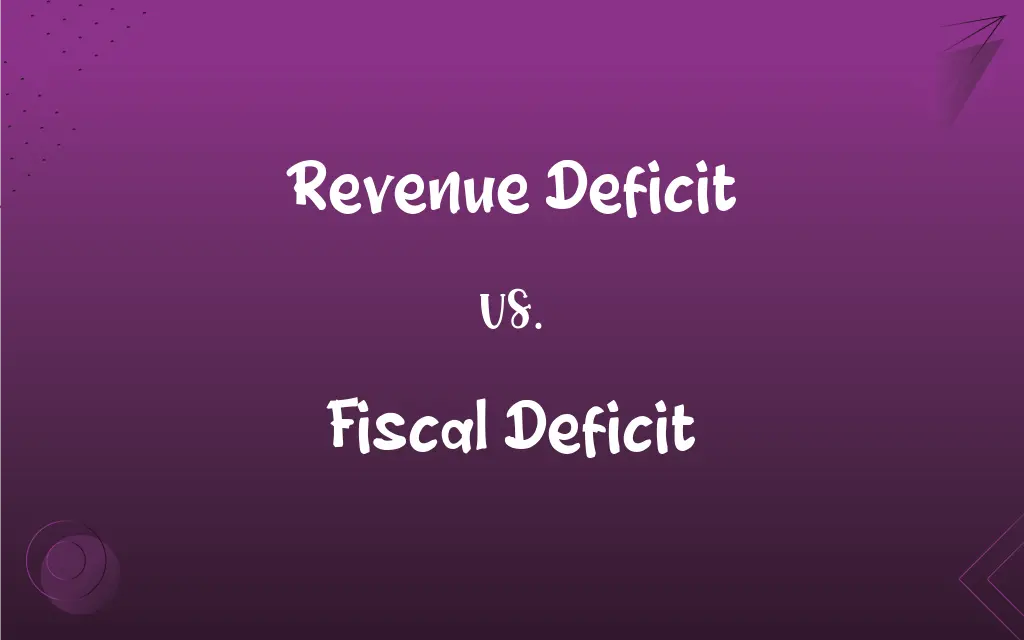Revenue Deficit vs. Fiscal Deficit: What's the Difference?
Edited by Aimie Carlson || By Harlon Moss || Published on November 11, 2023
Revenue deficit occurs when a government's income falls short of its operational expenses, while fiscal deficit arises when total expenditure exceeds total revenue, including loans and other sources.

Key Differences
Revenue deficit signifies a situation where a government's regular income, primarily from taxes and duties, is insufficient to cover its day-to-day operational expenses. This reflects the inability to meet running costs through regular income sources.
Fiscal deficit, on the other hand, is broader. It occurs when the government's total expenditures, including spending on infrastructure, defense, and welfare, surpass its total revenue, which encompasses not just regular income but also loans, borrowings, and other income sources. Fiscal deficit often necessitates borrowing.
Revenue deficit is a component of the fiscal deficit. A revenue deficit hints at structural problems in a government's budget, indicating an over-reliance on debt to finance regular operations.
Fiscal deficit, though perceived negatively, can have positive aspects if the borrowing fuels growth-oriented investments. However, sustained fiscal deficits can lead to mounting debts and economic instability.
Both revenue deficit and fiscal deficit are crucial indicators of a government's financial health, guiding policymakers in budget formulation and economic planning. Balancing these deficits is key to sustainable economic growth.
ADVERTISEMENT
Comparison Chart
Definition
Shortfall of income over operational expenses
Excess of total expenditure over total revenue
Indicates
Inability to meet running costs through regular income
Overall budgetary gap, including borrowings
Impact
Reflects structural budget issues
Indicates borrowing levels and investment potential
Component
Part of fiscal deficit
Encompasses revenue deficit and other expenditure
Economic Implication
May lead to operational inefficiencies
Can indicate growth if for investments, risk if for recurrent costs
ADVERTISEMENT
Revenue Deficit and Fiscal Deficit Definitions
Revenue Deficit
Income-Expenditure Mismatch.
The revenue deficit reflects a mismatch in fiscal planning.
Fiscal Deficit
Policy Challenge.
Controlling the fiscal deficit remains a central policy challenge.
Revenue Deficit
Budgetary Issue.
The rising revenue deficit alarmed the finance ministry.
Fiscal Deficit
Budgetary Gap.
The nation's fiscal deficit soared due to increased spending.
Revenue Deficit
Operational Gap.
The revenue deficit made it difficult to fund public services.
Fiscal Deficit
Borrowing Indicator.
A high fiscal deficit often indicates increased borrowing.
Revenue Deficit
Financial Indicator.
Economists are concerned about the country's growing revenue deficit.
Fiscal Deficit
Expenditure Excess.
Rising defense costs contributed to the fiscal deficit.
Revenue Deficit
Shortfall.
The government's revenue deficit was caused by declining tax revenues.
Fiscal Deficit
Economic Measure.
The fiscal deficit is a key measure of the government's financial health.
FAQs
Can a fiscal deficit be positive?
Yes, if it leads to growth-enhancing investments.
What causes a revenue deficit?
Lower-than-expected tax collections or high operational costs.
Is revenue deficit always bad?
It's usually a concern as it indicates structural budget issues.
Does revenue deficit affect credit ratings?
Yes, it can negatively impact a country's creditworthiness.
Is fiscal deficit the same as national debt?
No, fiscal deficit is annual; national debt is cumulative.
Can a country have no revenue deficit?
Yes, if regular income covers operational expenses.
Is fiscal deficit always due to overspending?
Often, but it can also result from revenue shortfalls.
Can revenue deficit lead to debt?
Yes, if regular operations are financed through borrowing.
How is revenue deficit calculated?
By subtracting regular income from operational expenses.
What's the difference between revenue and fiscal deficits?
Revenue deficit is operational; fiscal deficit is overall.
Is a zero fiscal deficit ideal?
Not always; some deficit can stimulate growth.
Does fiscal deficit always mean debt?
Often, but not always; depends on how the deficit is financed.
How can a fiscal deficit be reduced?
Through spending cuts, increased revenues, or economic growth.
Are all fiscal deficits harmful?
Not necessarily; depends on the purpose and economic context.
Can a surplus eliminate revenue deficit?
Yes, if operational expenses are fully covered.
How do governments address fiscal deficits?
Through budget reforms, spending cuts, or revenue increases.
Can fiscal policy reduce fiscal deficits?
Yes, through measures like taxation or spending adjustments.
Does revenue deficit affect economic growth?
It can, by limiting funds for development.
Do all countries experience revenue deficits?
Many do, but it varies based on economic conditions.
Does fiscal deficit impact inflation?
It can, especially if financed by money printing.
About Author
Written by
Harlon MossHarlon is a seasoned quality moderator and accomplished content writer for Difference Wiki. An alumnus of the prestigious University of California, he earned his degree in Computer Science. Leveraging his academic background, Harlon brings a meticulous and informed perspective to his work, ensuring content accuracy and excellence.
Edited by
Aimie CarlsonAimie Carlson, holding a master's degree in English literature, is a fervent English language enthusiast. She lends her writing talents to Difference Wiki, a prominent website that specializes in comparisons, offering readers insightful analyses that both captivate and inform.







































































